Racist Rabbis: A Long Legacy of Jewish Race-Haters
“The pursuit of wealth in slaves and usury not only violated Jewish ethics but destroyed the rough democracy imposed upon a people in exile. Initially, the Jews looked to their rabbis and scholars for guidance. Eventually, the aristocracy of learning gave way to the aristocracy of wealth. Leadership of the community passed from the wise man to the rich man, a curse of organizational Jewry even today.”
—Roberta Strauss Feuerlicht, The Fate of the Jews: A People Torn Between Israeli Power and Jewish Ethics, p. 39.
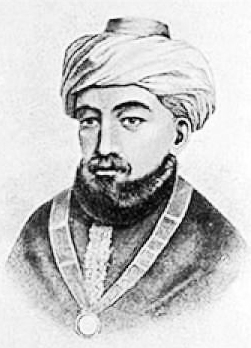
Rabbi Moses Maimonides instructed his people that Black Africans were “lower than the rank of man but higher than the rank of the apes.”
Yitzhak Yosef, the chief rabbi of the apartheid state of Israel, exposed for the world the Jewish mentality of that racist state when he unashamedly asserted that “Blacks Are Monkeys.” When confronted, the preeminent spiritual leader of the Chosen People doubled down and said that it was not his fault, that the sub-humanity of Blacks is a root teaching of Judaism’s holiest of holy books—The Talmud. So easily did the Hebrew word for “nigger” fall off the chief rabbi’s lips that one gets the impression that Judaism’s highest leadership circles are filled with hood- and sheet-wearing klansmen… Well, they are.
Blacks have been under the woefully false impression that among all whites their best friends have historically been the Jews. But, as the good Chief Rabbi has indicated, their Cheshire smiles and glad-handing Black people conceal a deeply entrenched racial viciousness that is at the very core of the world’s system of white supremacy. And it has been that way throughout the ages. The record of Jewish slave-trading is massive, and Jewish apologists have never been able to refute it. But these were not the acts of Jewish outcasts in the back alley of the shtetl: the mind of the slave-trader was shaped by the hallowed pulpits of the world’s most prominent synagogues. So let us review the racial record of Jewish community leaders—the rabbis and spiritual leaders at the center of Jewish life—going back in history to the most prominent in the Jewish world.
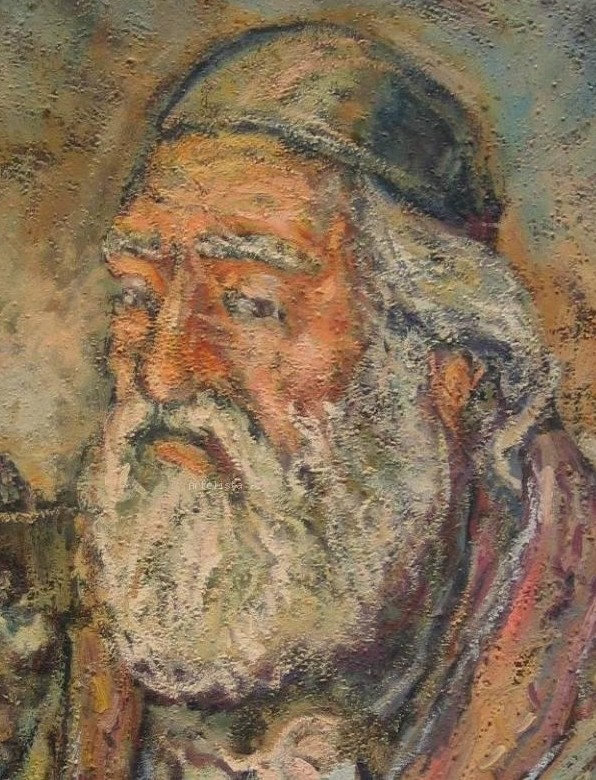
Racist Jewish legend Rabbi Judah Halevi
The Encyclopedia of the Jewish Religion refers to Moses Maimonides as “the symbol of the pure and orthodox faith.” In 1190 Rabbi Maimonides’s “truths” enabled Jewish slave-traders to target Africa because the continent was filled with sub-human black near-apes. He wrote:
“…the Negroes found in the remote South, and those who resemble them from among them that are with us in these climes. The status of those is like that of irrational animals. To my mind they do not have the rank of men, but have among the beings a rank lower than the rank of man but higher than the rank of apes…”
According to Wiesenthal Center historian Dr. Harold Brackman, Rabbi Judah Halevi and Maimonides were “the two greatest thinkers the medieval Jewish world produced,” and “virtually the only point” on which they “agree is that Blacks are biologically inferior.” Both based their “wisdom” on Talmudic authority.
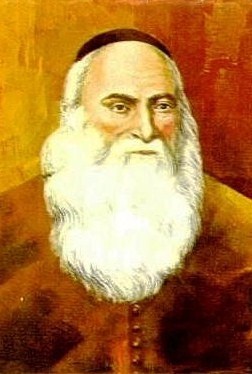
Rabbi Don Isaac Abravanel, the great racist sage of 15th-century Judaism.
Among the several Jewish financiers of Christopher Columbus‘s New World voyages was Rabbi Don Isaac Abravanel, the great sage of 15th-century Judaism. He was a major promoter of the despicable Talmudic fable known as the Curse of Ham—a racist invention of Jewish rabbis. Abravanel wrote that because of Ham’s crimes against his father, Noah, God cursed Ham’s descendants to be “black and ugly” and have “animal lusts, lacking intelligence and sciences and lacking political states.” This is the Jewish man that sent Columbus into the land of Africa and South America, where the Indigenous peoples suffered a Holocaust of immense proportions.
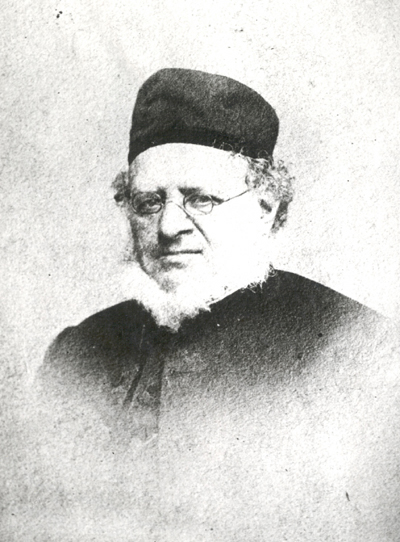
New York Rabbi Morris J. Raphall, the most prominent Jewish clergyman in the Civil War era, wrote passionately that “God Supports Slavery.”
When Jews began arriving in the Americas in the 15th century, they brought their racial teachings with them. Every single Jewish community in the Caribbean was built on slavery and thus all the spiritual leaders that served them endorsed and participated in the Black Holocaust. The Jewish lust for the profits of the sugar trade drove their migrations, and the Curse of Ham rabbinically sanctified the slaughter and enslavement of the Indian and the African.
America’s Jewish Defenders of Slavery
Jewish America was no different. When the Civil War was approaching, no event caused the forces of bondage to rejoice more than when Rabbi Morris Jacob Raphall of Congregation B’nai Jeshurun in New York issued a sermon that was to become known as the “Bible Defense of Slavery.” On January 4, 1861, he preached the most publicized sermon ever delivered by an American Jew up to that time. Said he:
“[I]t remains a fact which cannot be gainsaid that in his own native home, and generally throughout the world, the unfortunate negro is indeed the meanest of slaves. Much had been said respecting the inferiority of his intellectual powers, and that no man of his race has ever inscribed his name on the Parthenon of human excellence, either mental or moral.”
“What he did,” Rabbi Dr. Bertram Korn wrote, “was to place Judaism squarely in opposition to the philosophy of abolitionism…and insisted that…biblical tradition and law guaranteed the right to own slaves.” This critical confirmation of “God’s will” from a prominent and respected Jewish authority, indeed the highest-paid American clergyman, gave the slavemaster all he needed to fight the righteous battle against the abolitionists.

Rabbi Isaac Mayer Wise, the “father of Reform Judaism,” supported slavery and cited the Talmud as his source.
Rabbi Isaac Mayer Wise was the FOUNDER of Reform Judaism, which is today practiced by most American Jews. In significance, Rabbi Wise might be viewed as the Martin Luther King of American Jews. But those men have only a figurative connection, for Rabbi Wise viewed Blacks as “representing all that is debased and inferior in the hopeless barbarity and heathenism of six thousand years.” He defended slavery, saying that “The Negro was never free; and his bondage in Africa was simply duplicated in a milder form when he was imported here.” He considered abolitionists to be “fanatics,” “demagogues,” “demons of hatred and destruction,” and “habitual revolutionaries, who feed on excitement and delight in civil wars…”
Wise’s biographer, James G. Heller, said of his subject: “Clearly the Abolitionists…were men whom he would detest and of whom he would disapprove with all the force of his soul.”
Worse, Wise’s racial wisdom was far-reaching. He set up the first training center for American rabbis and sent his race-corrupted graduates to serve Jewish communities throughout the cotton South, where the brutal enslavement of the African was most intense, and where Jewish profits from the lucrative trade were most exceptional. More slave-trade sanctification from Reform Judaism’s founding father, Rabbi Wise:
“…We are not prepared, nobody is, to maintain it is absolutely unjust to purchase savages, or rather their labor, place them under the protection of law, and secure them the benefit of civilized society and their sustenance for their labor. Man in a savage state is not free; the alien servant under the Mosaic law was a free man, excepting only the fruits of his labor.”
These were the rabbinical “stand-outs,” but there was no shortage of race-hating rabbis who were salivating to reinforce Black slavery and the immense cotton, tobacco, and sugar wealth that it brought to the Jewish communities they led. Rabbi George Jacobs of Richmond, Virginia, owned and rented slaves. Rabbi A. Gunzberg of Rochester, New York, wrote a letter complaining of the “high standing politicians who are very zealous for the half-civilized Negro, [but] so illiberal against our nation.” Rabbis Simon Tuska of Memphis and James K. Gutheim of New Orleans both defended the enslavement of Blacks to their congregations. Gutheim, the most distinguished of the South’s Jewish clergymen, chose to move his family to the home of his in-laws in Mobile rather than take an oath of allegiance to the United States and the “Dictator of Washington,” Abraham Lincoln. Similarly, Rabbi Henry S. Jacobs, who had served Beth Shalome of Richmond for three years (1854-1857) before moving on to Charleston, denounced those Jews who stood against the Confederacy. The slaveholding Charleston rabbi Gustavus Poznanski summed up the Jewish American credo in messianic terms:
This [Charleston] synagogue is our temple, this city our Jerusalem, this happy land our Palestine, and as our fathers defended with their lives that temple, that city, and that land, so will our sons defend this temple, this city, and this land.
Rabbi Michelbacher of Richmond, Virginia, composed a prayer for the slavery cause, which read in part:
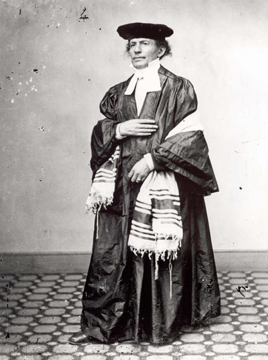
Rabbi M.J. Michelbacher prayed for slavery—in Hebrew.
“Be unto the Army of this Confederacy, as thou were of old, unto us, thy chosen people – Inspire them with patriotism! Give them when marching to meet, or, overtake the enemy…”
Rabbi Michelbacher justified the enslavement and the prison-like atmosphere of the slave states in this prayer, reasoning that it was the only means to prevent a repetition of the Saint Dominique massacre of the 1790s:
“…Behold, O God, [the abolitionists] invite our man-servants to insurrection, and they place weapons of death and the fire of desolation in their hands that we may become an easy prey unto them; they beguile them from the path of duty that they may waylay their masters, to assassinate and to slay the men, women and children of the people that trust only in Thee. In this wicked thought, let them be frustrated, and cause them to fall into the pit of destruction, which in the abomination of their evil intents they digged out for us, our brothers and sisters, our wives and our children.”
Rabbi Alexander Marks was the acting rabbi in New Orleans in the 1830s, a major hub for slave traders and the products of slave labor. The rabbi owned eleven Africans, according to the 1840 census. Rabbi Manis Jacobs (c. 1782-1839) was the spiritual leader of New Orleans Jews and he also held eleven Black people as slaves. Rabbi Harold I. Sharfman writes of Jacobs: “He proudly signed his name in Hebrew on bills of sale, as a cachet or seal — some on his transactions involving the purchase of slaves still exist.” Even the rabbi of the island of Barbados, Rabbi Haham Lopez, had the “enjoyment of his own two negro attendants.”
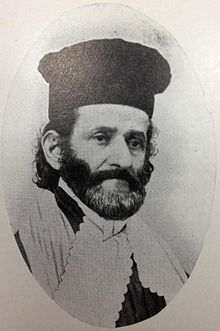
Slavery defender Rabbi Bernard Illowy
Rabbi Bernard Illowy, distinguished leader of Baltimore’s Orthodox Hebrew Congregation, declared his open sympathy for slave property rights:
“Who can blame our brethren of the South for seceding from a society whose government cannot or will not protect the property, rights and privileges of a great portion of the Union against the encroachments of a majority misguided by some influential, ambitious aspirants and selfish politicians who, under the color of religion and the disguise of philanthropy, have thrown the country into a general state of confusion, and millions into want and poverty?”
Illowy, as with his other slave-making religionists, turned to the Bible for justification: “Why did not Moses…prohibit the buying or selling of slaves?” “Where was ever a greater philanthropist than Abraham, and why did he not set free his slaves?” When federal troops occupied New Orleans, the rabbi and most of his congregation refused to take the oath and were deported.
No Blacks Allowed in the Synagogue
The rabbis were already enforcing a system of apartheid within their places of worship, an action entirely compatible with their public positions on the issue. The rules of Southern Jewish synagogues, says Joseph P. Weinberg, “reflect a clear and conscious desire to exclude Blacks from Jewish fellowship.” Rabbi Dr. Jacob Rader Marcus writes that Richmond’s Beth Shalome or House of Peace, the most democratic of the nation’s six synagogues, was dedicated to “peace and friendship,” yet membership was restricted to “any free man.” This stipulation, Rabbi Marcus says, “would seem to be directed against Negro slaves who might be attracted to the synagogue of their masters.” Likewise, in the 1820 constitution of Beth Elohim of Charleston, “people of colour” were excluded from membership.
According to Rabbi Korn, some rabbis were directly employed by the Confederate Army because “the Confederate Congress was more liberal and tolerant than its Washington counterparts” with regard to the appointment of Jewish chaplains in the army.

Rabbi Jacob Levin sells Black human beings in 1852.
Rabbi Jacob Levin of Columbia, South Carolina, was the leader of his Jewish community in the mid-1800s and a slave-trading auctioneer. He was quoted in prestigious Jewish periodicals, and his wife was director of the Columbia Hebrew Sunday School. He was also the secretary and treasurer of the Hebrew Benevolent Society of Columbia and a grand master of the Masons. On December 17, 1852, he advertised in the Columbia Daily South Carolinian the sale of “22 Likely Negroes, the larger number of which are young and desirable.“
Where Are the Jewish Abolitionists?
Jews can’t argue with those facts, and they search in vain for abolitionists. But the only notable rabbi who came close to abolitionism was Rabbi David Einhorn of Baltimore. According to the Jewish scholar Dr. Leonard Dinnerstein, Einhorn “is the only prominent southern Jew who is known to have spoken out against slavery. Others either kept silent or gave whole-hearted support to the Southern ideology.”
Einhorn’s eloquent rebuke of the evil institution found no sanction, however, among the Jewish community. The Jews of his own congregation rejected his uncompromising stand on the issue. Indeed, they ran him out of their pulpit and out of Baltimore, forcing him to flee in the night.
Even the American and Foreign Anti-Slavery Society wondered aloud where the Jews were in the movement. In 1853 they complained that “The Jews of the United States have never taken any steps whatever with regard to the slavery question…”
And so it is today. The ideological leaders of the Jewish faith have throughout history set a demonically racist standard that has endorsed and sanctified rather than condemned the most racist Jewish acts and behaviors toward Blacks all over the world. Jews like Israel’s “Chief Rabbi” have now come out and boldly declared that racism is a Talmudic dictum and has always worked for them and their fathers, and they are sticking with it. Their direct targeting of Black political leaders all over the globe, their wanton murder of the Palestinians, their expulsion of the “non-white” from a land they stole, the series of “false flag” terrorist acts they have committed and blamed on others—all of those acts should be the final wake-up call to the Black man and woman about who the Satanic Jews are and who they have always been. Just as in Job 1:7, we—like the long-deceived angels—have walked up to God with our “hypocritical friend” but His open enemy on our arm. And now that The God has pointed him out, are we ready to believe Him?
-30-
Anatomy of Rabbi Jacob Levin’s Slave Sale Advertisement



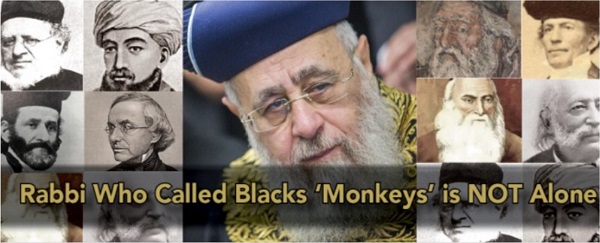

Leave a comment
You must be logged in to post a comment.